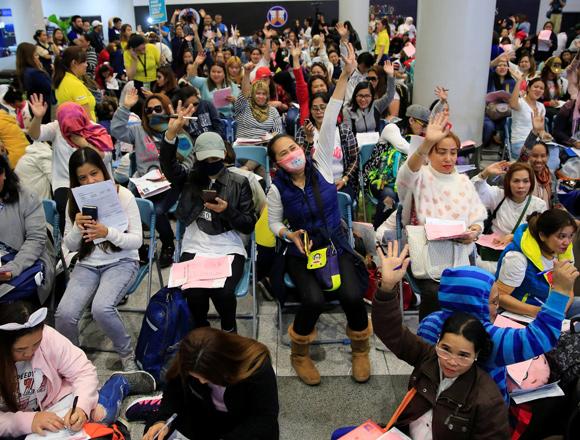You are here
Lebanon accused of abusing Syrian refugees
By Thomson Reuters Foundation - Jan 13,2016 - Last updated at Jan 13,2016
LONDON — Lebanon is effectively barring many Syrian refugees from renewing their residency permits, putting them at risk of exploitation and "setting the stage for a potentially explosive situation", rights campaigners warned on Tuesday.
Human Rights Watch said a $200 annual renewal fee introduced last year was prohibitive for most Syrian refugees in Lebanon where the great majority rely on aid.
HRW's deputy director for Middle East Nadim Houry warned that the residency rules were "making life impossible for refugees... and pushing them underground".
"The last thing Lebanon needs is a large, undocumented community living at the margins of society, at heightened risk of abuse."
Lebanon is hosting more than 1 million refugees who have fled Syria since the start of civil war almost five years ago, the highest per capita concentration of refugees in the world.
Only two of the 40 refugees interviewed for an HRW report said they had been able to renew their residencies.
Obstacles included high fees, prohibitive paperwork requirements and arbitrary application of the regulations, according to the report titled "I Just Wanted to be Treated like a Person".
The lack of legal status leaves Syrians vulnerable to exploitation — including labour abuse and sexual abuse — and means they cannot turn to the authorities for protection, HRW said.
It is not known how many refugees lack legal status in Lebanon, which is not party to the 1951 Refugee Convention. Officials at Lebanon's ministry of social affairs could not immediately be reached for comment.
‘I feel like a slave’
HRW said refugees applying to renew residency permits are split into two groups: those registered with the UN refugee agency (UNHCR) and those who must find a Lebanese sponsor to remain in the country.
However many UNHCR-registered refugees reported that officials asked them to provide a sponsor, even though the rules do not require it.
The need to find a sponsor raises the risk of corruption. One refugee is quoted as saying that sponsors were making a business out of the crisis, selling sponsorships to refugees for up to $1,000.
Potential sponsors wait on the Syrian border or at the airport to sell sponsorships to new arrivals, he said.
Another refugee, Amr, told HRW that the fact his sponsor was also his employer had locked him into a cycle of abuse.
"My boss makes me work more than 12 hours a day at his shop. Sometimes I complain but then he threatens to cancel my sponsorship. What can I do? I have to do whatever he says. I feel like his slave," he was quoted as saying.
Refugees who are working said employers often underpaid them, taking advantage of their inability to complain. Five women told HRW that sponsors and employers had attempted to sexually exploit them.
Syrians without residency cannot move freely for fear of arrest, HRW said, meaning more families are relying on their children to work because minors are less likely to be stopped at checkpoints.
Parents also said that some schools refused to enroll children without a valid residency even though this is not required for school registration.
The report added that babies born to parents without legal status risk becoming stateless.
Related Articles
BEIRUT — After taking in a million Syrian refugees, Lebanon has quietly changed course in recent months, forcing refugees to return to Syria
AMMAN — Several labour rights organisations have recently voiced their concerns over the application of the kafalah (sponsorship) system on
DUBAI — Human Rights Watch (HRW) called on Kuwait to agree to greater protection for migrant workers, as a Philippine delegation was due in














